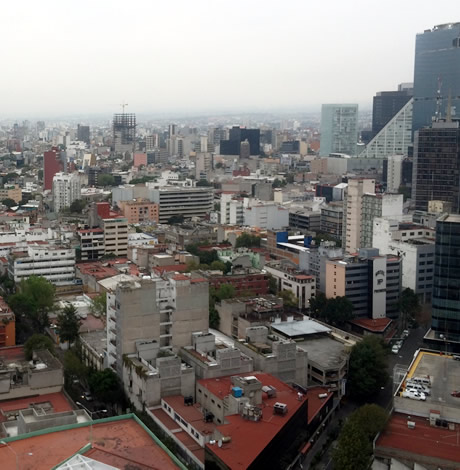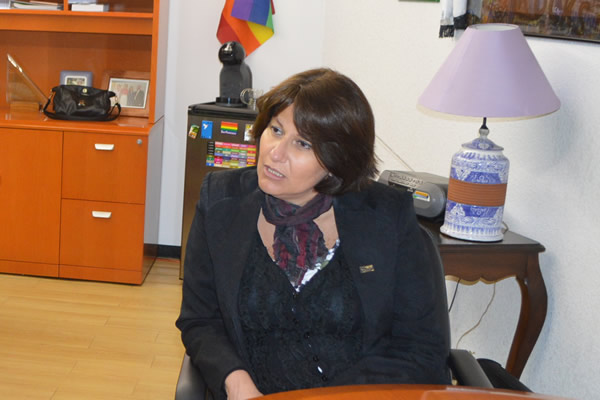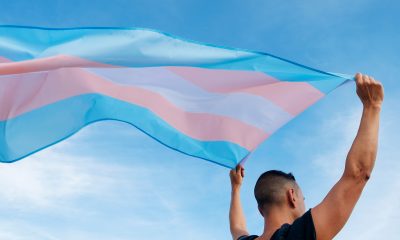News
Mexico City lawmakers approve trans rights bill
Measure to allow legal gender changes without court order


Jacqueline L’Hoist Tapía, president of the Mexico City Council to Prevent and Eliminate Discrimination, supports transgender people’s ability to legally change their gender in the Mexican capital without a court order. (Photo by Angélica Pineda)
Members of Legislative Assembly of the Federal District, in which Mexico City is located, approved the measure by a 42-0 vote margin. Six lawmakers abstained from the vote on the measure that Mexico City Mayor Miguel Ángel Mancera proposed.
Manuel Granados Covarrubias of the Party of the Democratic Revolution, known by the Spanish acronym PRD, welcomed the proposal’s approval.
“It eliminates cumbersome trials and judicial proceedings, procedures, to generate the administrative change of a legal action to which everyone has the right,” said Granados in a press release the Legislative Assembly of the Federal District released after lawmakers approved the measure. “Their dignity is also recognized.”
The Mexico City Commission to Prevent and Eliminate Discrimination, known by its Spanish acronym COPRED, launched a campaign in support of the measure.
COPRED spokesperson René Said Nieto told the Washington Blade that Mexico City on Thursday “took a major step forward” towards the recognition of trans people.
“(The measure) guarantees the rights of people to the recognition of their gender identity,” said the Human Rights Program of the Federal District in a statement.
Mexico City is the first city in Latin America to allow trans people to legally change the gender on their birth certificates without a medical examination. The Mexican capital’s comprehensive anti-discrimination law already includes gender identity and expression and designates transphobia as a form of discrimination.
Argentina President Cristina Fernández de Kirchner in 2012 signed a law that allows trans Argentinians to legally change their gender on official documents without sex-reassignment surgery and an affidavit from a doctor or another medical provider. The Chilean Senate next week is expected to vote on a bill that would allow trans people in the South American country to legally change their name and sex without sex-reassignment surgery.
Supporters of Mariela Castro, daughter of Cuban President Raúl Castro, credit her with successfully lobbying her father’s government to begin offering free sex-reassignment surgery under the country’s national health care system in 2008.

The Comings & Goings column is about sharing the professional successes of our community. We want to recognize those landing new jobs, new clients for their business, joining boards of organizations and other achievements. Please share your successes with us at [email protected].
The Comings & Goings column also invites LGBTQ+ college students to share their successes with us. If you have been elected to a student government position, gotten an exciting internship, or are graduating and beginning your career with a great job, let us know so we can share your success.
Congratulations to David Reid on his new position as Principal, Public Policy, with Brownstein Hyatt Farber Schreck. Upon being named to the position, he said, “I am proud to be part of this inaugural group of principals as the firm launches it new ‘principal, public policy’ title.”
Reid is a political strategist and operative. He is a prolific fundraiser, and skilled advocate for legislative and appropriations goals. He is deeply embedded in Democratic politics, drawing on his personal network on the Hill, in governors’ administrations, and throughout the business community, to build coalitions that drive policy successes for clients. His work includes leading complex public policy efforts related to infrastructure, hospitality, gaming, health care, technology, telecommunications, and arts and entertainment.
Reid has extensive political finance experience. He leads Brownstein’s bipartisan political operation each cycle with Republican and Democratic congressional and national campaign committees and candidates. Reid is an active member of Brownstein’s pro-bono committee and co-leads the firm’s LGBT+ Employee Resource Group.
He serves as a Deputy National Finance Chair of the Democratic National Committee and is a member of the Finance Committee of the Democratic Governors Association, where he previously served as the Deputy Finance Director.
Prior to joining Brownstein, Reid served as the Washington D.C. and PAC finance director at Hillary for America. He worked as the mid-Atlantic finance director, for the Democratic Senatorial Campaign Committee and ran the political finance operation of a Fortune 50 global health care company.
Among his many outside involvements, Reid serves on the executive committee of the One Victory, and LGBTQ Victory Institute board, the governing bodies of the LGBTQ Victory Fund and Institute; and is a member of the board for Q Street.
Congratulations also to Yesenia Alvarado Henninger of Helion Energy, president; Abigail Harris of Honeywell; Alex Catanese of American Bankers Association; Stu Malec, secretary; Brendan Neal, treasurer; Brownstein’s David Reid; Amazon’s Suzanne Beall; Lowe’s’ Rob Curis; andCornerstone’s Christian Walker. Their positions have now been confirmed by the Q Street Board of Directors.
District of Columbia
D.C. pays $500,000 to settle lawsuit brought by gay Corrections Dept. employee
Alleged years of verbal harassment, slurs, intimidation

The D.C. government on Feb. 5 agreed to pay $500,000 to a gay D.C. Department of Corrections officer as a settlement to a lawsuit the officer filed in 2021 alleging he was subjected to years of discrimination at his job because of his sexual orientation, according to a statement released by the American Civil Liberties Union of D.C.
The statement says the lawsuit, filed on behalf of Sgt. Deon Jones by the ACLU of D.C. and the law firm WilmerHale, alleged that the Department of Corrections, including supervisors and co-workers, “subjected Sgt. Jones to discrimination, retaliation, and a hostile work environment because of his identity as a gay man, in violation of the D.C. Human Rights Act.”
Daniel Gleick, a spokesperson for D.C. Mayor Muriel Bowser, said the mayor’s office would have no comment on the lawsuit settlement. The Washington Blade couldn’t immediately reach a spokesperson for the Office of the D.C. Attorney General, which represents the city against lawsuits.
Bowser and her high-level D.C. government appointees, including Japer Bowles, director of the Mayor’s Office of LGBTQ Affairs, have spoken out against LGBTQ-related discrimination.
“Jones, now a 28-year veteran of the Department and nearing retirement, faced years of verbal abuse and harassment from coworkers and incarcerated people alike, including anti-gay slurs, threats, and degrading treatment,” the ACLU’s statement says.
“The prolonged mistreatment took a severe toll on Jones’s mental health, and he experienced depression, Post-Traumatic Stress Disorder, and 15 anxiety attacks in 2021 alone,” it says.
“For years, I showed up to do my job with professionalism and pride, only to be targeted because of who I am,” Jones says in the ACLU statement. “This settlement affirms that my pain mattered – and that creating hostile workplaces has real consequences,” he said.
He added, “For anyone who is LGBTQ or living with a disability and facing workplace discrimination or retaliation, know this: you are not powerless. You have rights. And when you stand up, you can achieve justice.”
The settlement agreement, a link to which the ACLU provided in its statement announcing the settlement, states that plaintiff Jones agrees, among other things, that “neither the Parties’ agreement, nor the District’s offer to settle the case, shall in any way be construed as an admission by the District that it or any of its current or former employees, acted wrongfully with respect to Plaintiff or any other person, or that Plaintiff has any rights.”
Scott Michelman, the D.C. ACLU’s legal director said that type of disclaimer is typical for parties that agree to settle a lawsuit like this.
“But actions speak louder than words,” he told the Blade. “The fact that they are paying our client a half million dollars for the pervasive and really brutal harassment that he suffered on the basis of his identity for years is much more telling than their disclaimer itself,” he said.
The settlement agreement also says Jones would be required, as a condition for accepting the agreement, to resign permanently from his job at the Department of Corrections. ACLU spokesperson Andy Hoover said Jones has been on administrative leave since March 2022. Jones couldn’t immediately be reached for comment.
“This is really something that makes sense on both sides,” Michelman said of the resignation requirements. “The environment had become so toxic the way he had been treated on multiple levels made it difficult to see how he could return to work there.”
Virginia
Spanberger signs bill that paves way for marriage amendment repeal referendum
Proposal passed in two successive General Assembly sessions

Virginians this year will vote on whether to repeal a state constitutional amendment that defines marriage as between a man and a woman.
Democratic Gov. Abigail Spanberger on Friday signed state Del. Laura Jane Cohen (D-Fairfax County)’s House Bill 612, which finalized the referendum’s language.
The ballot question that voters will consider on Election Day is below:
Question: Should the Constitution of Virginia be amended to: (i) remove the ban on same-sex marriage; (ii) affirm that two adults may marry regardless of sex, gender, or race; and (iii) require all legally valid marriages to be treated equally under the law?
Voters in 2006 approved the Marshall-Newman Amendment.
Same-sex couples have been able to legally marry in Virginia since 2014. Former Gov. Glenn Youngkin, who is a Republican, in 2024 signed a bill that codified marriage equality in state law.
Two successive legislatures must approve a proposed constitutional amendment before it can go to the ballot.
A resolution to repeal the Marshall-Newman Amendment passed in the General Assembly in 2025. Lawmakers once again approved it last month.
“20 years after Virginia added a ban on same-sex marriage to our Constitution, we finally have the chance to right that wrong,” wrote Equality Virginia Executive Director Narissa Rahaman on Friday in a message to her group’s supporters.
Virginians this year will also consider proposed constitutional amendments that would guarantee reproductive rights and restore voting rights to convicted felons who have completed their sentences.
-

 District of Columbia5 days ago
District of Columbia5 days agoD.C. Council gives first approval to amended PrEP insurance bill
-

 2026 Midterm Elections5 days ago
2026 Midterm Elections5 days agoLGBTQ Victory Fund looks beyond Washington for change in 2026
-

 National5 days ago
National5 days agoHuman Rights Watch sharply criticizes US in annual report
-

 Congress5 days ago
Congress5 days agoNew Equality Caucus vice chair endorses Equality Act, federal trans bill of rights
















